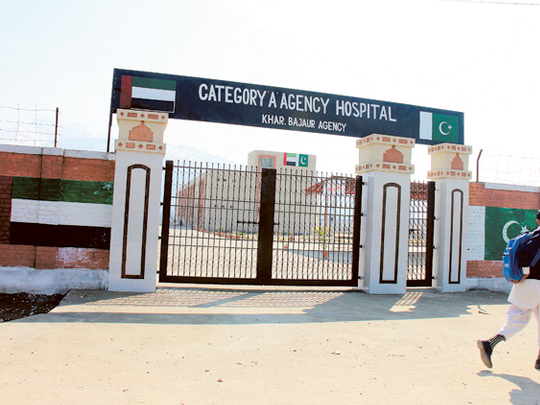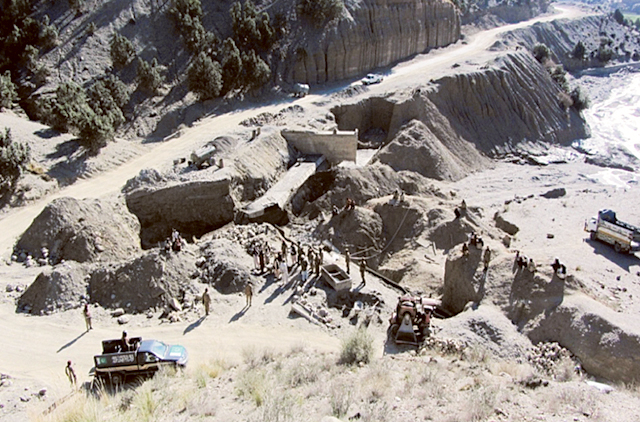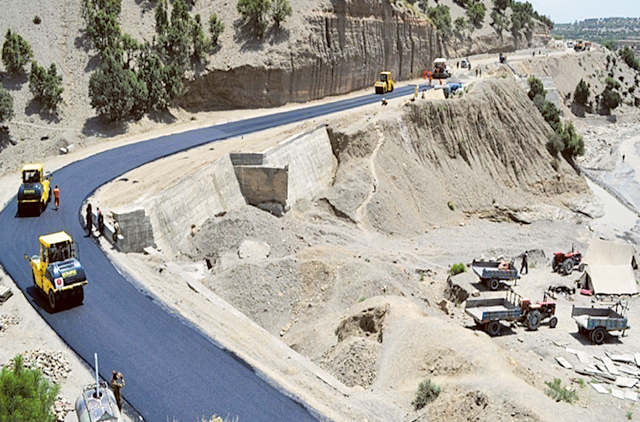
Islamabad: Pakistan shares a deep historic bond with the United Arab Emirates that has only strengthened with time. The close ties between the two have been especially reinforced in crises, with the UAE having gone beyond bilateral norms to extend help, whether it was for relief work or rebuilding and rehabilitation efforts, following a natural disaster or conflict.
This has generated tremendous amount of goodwill among the people of the affected areas, who are the biggest beneficiaries. Travelling by road in Swat, and the tribal agencies of Bajaur and South Waziristan, one can see the UAE-Pakistan Assistance Programme (UAE-PAP) boards proudly proclaiming some development scheme or the other. Many of these projects are now functional and have proved highly successful in meeting critical needs of the people in those areas.
In the wake of a devastating flood that hit Pakistan in 2010, many parts of the country suffered extensive damage. The northern mountainous area of Swat had at the time just rebounded after a military operation conducted by the Pakistan army against the Swati Taliban headed by Mullah Fazlullah. The flood wreaked further damage. Unable to cope with the devastation the Pakistan government faced a predicament that could only be solved with outside help.
The first to respond to Pakistan’s call for help was no other than the UAE. On the directive of the President His Highness Shaikh Khalifa Bin Zayed Al Nahyan, an initiative was launched in January 2011 to help the country rebuild.
The UAE-PAP has not only been meeting the need to rebuild and develop critical infrastructure needs of flood- and conflict-affected Swat, it has also focused attention to vital sectors of education, health and water supply schemes. Moreover, this comprehensive programme is also targeting other under-developed areas of the Federally Administered Tribal areas (Fata) bordering Afghanistan.
The significance of this development goes beyond the immediate. These areas have been more or less widely neglected because of lack of resources and other factors. At times when funds were even set aside there was little implementation on ground because of the apathy of the political administration and lack of political will to address the needs of this area. As a result, the lack of development and resources in Fata proved a breeding ground for extremism and then militancy.
Fortunately, an opportunity born out of the post-military operations was utilised to counter the hold of the Taliban and other anti-state groups. This is why the UAE assistance to develop these areas has vital long term implications.
An additional advantage is the high esteem Pakistanis have for the UAE. As a result, any project bearing the UAE flag alongside Pakistan’s is doubly appreciated by the people as was witnessed by Gulf News while visiting the area.
Working in collaboration with the Pakistan Army, the UAE-PAP has successfully completed many critical infrastructure and water supply projects. Besides, several educational institutes and hospitals have already been constructed and many more are in the pipeline.
In Swat, the Shaikh Khalifa Bin Zayed Al Nahyan Bridge at Barikot was inaugurated in May last year. This class 70 bridge constructed at the cost of $10.99 million (Dh40.3 million) is first of its kind in Pakistan.
Another bridge, Shaikh Zayed Bin Sultan Al Nahyan Bridge at Shamozai in Swat which is expected to benefit a million people is also near completion.
The UAE-PAP has also funded the construction of a vital road linking Wana with Angoor Ada in South Waziristan. The 50km, Shaikh Khalifa Bin Zayed Al Nahyan road is part of the third trade corridor between Pakistan and Afghanistan, which will eventually connect with the Ring Road in Afghanistan.
It is expected to boost trade and help local economy on both sides of the border. The other road the UAE is funding is currently under construction in North Waziristan. Spanning 73 km, it will link Miranshah, Razmak and Makeen. This will eventually link with Ghulam Khan on the Afghan border and provide a conduit to travel into South Waziristan.
The UAE has also been supporting education in a big way. Projects to upgrade and build new schools, vocational and technical training institutes and a cadet college have been successfully implemented.
In Bajaur, a Category A hospital wing has been constructed by the UAE-PAP. Expected to open this month, it will be a big help to the people of the agency that currently depend on the Khar Head Quarter Hospital that has limited capacity.
M Khan, the superintendent at Khar hospital, told Gulf News, “The UAE government has helped in expanding the hospital to type A hospital. With this, the hospital will have a bed strength of a 1,000 beds. The building has already been completed with a nephrology unit, paediatric surgery, neuro surgery and skin units. This was constructed by the army engineering corps and with help of UAE funding. In March, the hospital equipment will arrive and it will then be functional. This teaching hospital will also be a nursing school; it will open way for girls to come into this field. In our tribal set-up, sending girls to hospitals is not liked but when a facility is available at their doorstep the people will send their daughters to learn nursing.”
Besides the hospital, the UAE has also constructed and funded a technology college in Khar, Bajaur, that is aimed at boosting vocational and technical training for the people of this area.
In South Waziristan, the UAE is also planning to build a hospital and a cadet college. Currently, the cadet college Spinkai is being housed on the premises of Waziristan Technical College in Chagmalai but will be moved to the new building once construction is complete.
The UAE has already provided the funds for this cadet college which is to be built on land donated by the local Mehsud tribesmen. This cadet college has received children of local tribesmen as well as from all over Pakistan. The idea is to promote greater interaction and remove misconceptions thus alleviating animosities.
While the immediate impact of this resurgence in development work is of course realised, view of a long-term impact of these projects is invaluable.














